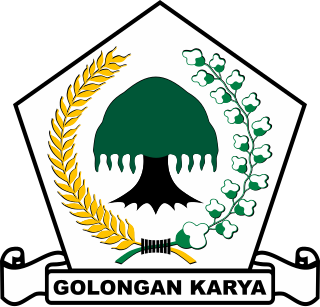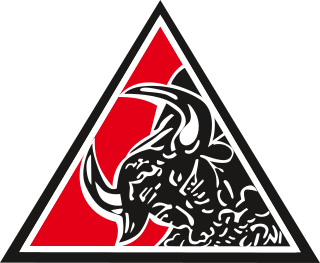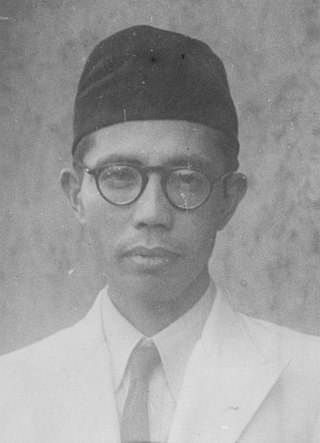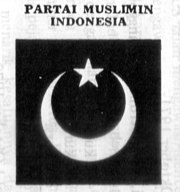
The politics of Indonesia take place in the framework of a presidential representative democratic republic whereby the President of Indonesia is both head of state and head of government and of a multi-party system. Executive power is exercised by the government. Legislative power is vested in both the government and the bicameral People's Consultative Assembly. The judiciary is independent of the executive and the legislature.

The Party of Functional Groups, often known by its abbreviation Golkar, is a centre-right big tent political party in Indonesia. It was founded as the Joint Secretariat of Functional Groups in 1964, and participated for the first time in national elections in 1971 as Functional Groups. Since 2019, it has been the second-largest party in the House of Representatives (DPR) with 85 seats. It is led by Airlangga Hartarto.

The United Development Party is an Islam-based political party in Indonesia. Due to its distinctive logo, the party is known as the "Kaaba Party".

Nahdlatul Ulama is an Islamic organization in Indonesia. Its membership numbered over 95 million in 2021, making it the largest Islamic organization in the world. NU is also a charitable body funding schools and hospitals as well as organizing communities to help alleviate poverty.

The Indonesian Democratic Party was one of the two state-approved parties during the New Order era of the late 20th-century in Indonesia.

The Indonesian National Party was the name used by several nationalist political parties in Indonesia from 1927 until 1973. The first PNI was established by future President Sukarno. After independence, the new PNI supplied a number of prime ministers, and participated in the majority of cabinets in the 1950s and 1960s. The party was fused into the Indonesian Democratic Party in 1973. In the years following the reforms of the late 1990s, a number of parties claiming to be the continuation of previous PNIs stood in elections, but gained only a handful of seats.

The Crescent Star Party is a political party in Indonesia.

The New Order describes the regime of the second Indonesian President Suharto from his rise to power in 1966 until his resignation in 1998. Suharto coined the term upon his accession and used it to contrast his presidency with that of his predecessor Sukarno.

The Council of Indonesian Muslim Associations Party, better known as the Masyumi Party, was a major Islamic political party in Indonesia during the Liberal Democracy Era in Indonesia. It was banned in 1960 by President Sukarno for supporting the PRRI rebellion.

Legislative elections were held in Indonesia on 3 July 1971, the first under the New Order regime. There were ten participants; nine political parties and the "functional group" Golkar, which came first with more than 60 percent of the vote, resulting in an absolute majority in the People's Representative Council.

Burhanuddin Harahap was an Indonesian politician and lawyer who served as prime minister of Indonesia from August 1955 until March 1956. He was a member of the Masyumi Party and served as Minister of Defense concurrently with his tenure as prime minister. Afterward, he took part in the unsuccessful Revolutionary Government of the Republic of Indonesia (PRRI) rebellion in West Sumatra.

Sjafruddin Prawiranegara was an Indonesian statesman and economist. He served in various roles during his career, including as head of government in the Emergency Government of the Republic of Indonesia, as Minister of Finance in several cabinets, and as the first Governor of Bank Indonesia. Sjafruddin later became the prime minister of the Revolutionary Government of the Republic of Indonesia, a shadow government set up in opposition to the country's central government.

Indonesian Islamic Union Party was an Islamic political party in Indonesia before and after independence. In 1973 it was merged into the United Development Party.

The League of Supporters of Indonesian Independence was a right-wing nationalist political party in Indonesia established by former Army head General Abdul Haris Nasution as a vehicle for the Indonesian Army to enter the realm of politics. It was influential in persuading President Sukarno to introduce Guided Democracy in Indonesia and return to the 1945 Constitution.
The 27 July Incident was an attack by Indonesian government forces on the head office of the Indonesian Democratic Party, which was being occupied by supporters of recently ousted party leader Megawati Sukarnoputri. It was followed by two days of riots in Jakarta.

Ismail Hasan Metareum was a politician from the United Development Party. He served as the party's chairman from 1989 until 1998, the vice chairman of the People's Representative Council from 1997 until 1999, and vice chairman of the Supreme Advisory Council.

Union of Islamic Education, also known as PERTI, is a Shafii-Ash'ari Islamic organization in Indonesia. The organization was founded by Sulaiman ar-Rasuli on May 5, 1928 in Candung, West Sumatra. In its development, PERTI had become a political party and gained four People's Representative Council (DPR-RI) seats and seven Constituent seats in 1955 general election.

Jusuf Wibisono was an Indonesian politician and economist. A member of the Masyumi Party, he served as Minister of Finance from 1951 until 1952 and again from 1956 until 1957, under the Soekiman and Second Ali Sastroamidjojo cabinets. Originating from Magelang, Wibisono took part in Islamic organizations in the nationalist movement from his school years. He joined Masyumi during the Indonesian National Revolution, and became a leading member within the party despite disagreements with other party leaders such as Mohammad Natsir. In both of his tenures as finance minister, he relaxed the tight budgetary controls of his predecessor, and provided favors to political parties.

Prawoto Mangkusasmito was an Indonesian politician who served as the final chairman of the Masyumi political party before its dissolution in 1960. He also served as the Deputy Prime Minister of Indonesia during the Wilopo Cabinet between 1952 and 1953.


















